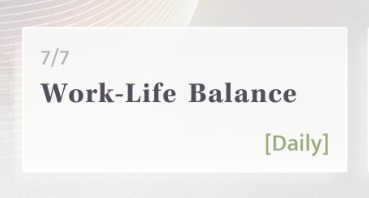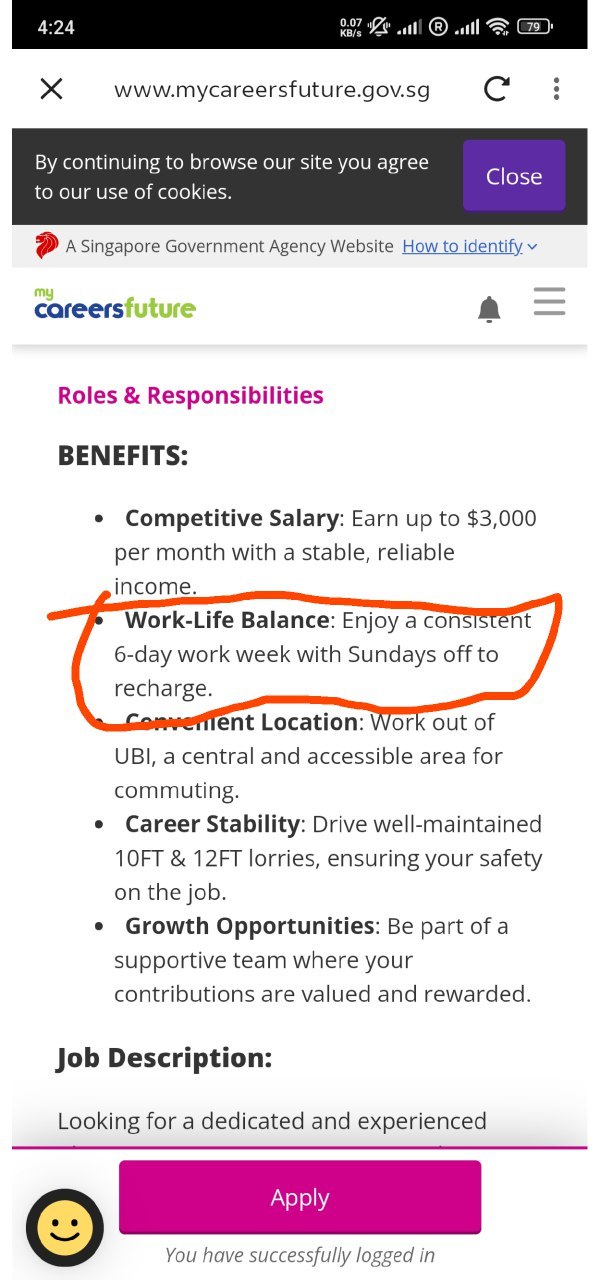#Work-Life Balance
Explore tagged Tumblr posts
Text
There’s no such thing as work-life balance for neurodivergent & chronically ill people.
This is because everything in my life requires work:
maintaining friendships
keeping up with my hygiene
managing bills
making money
remembering my basic needs
sleeping regularly
outputting creatively
All requires some aspect of work for me.
And when everything in your life requires work, your balance goes out the window.
If you're neurodivergent and overwhelmed — I see you.
If you're chronically ill and overwhelmed — I see you.
You're not dysfunctional.
You're not incapable.
You're doing your best.
#neurodivergencies#actually adhd#neurodivergence#actually audhd#actually autistic#audhd#autism#neurodivergent#neurodiversity#work-life balance#work life balance#neurodivergent at work#working neurodivergent#chronically ill#chronic illness
63K notes
·
View notes
Text

#UK#four-day workweek#trial results#company adoption#productivity#revenue growth#employee well-being#reduced stress#burnout#work-life balance#office#work#jobs#psychology
424 notes
·
View notes
Text
Work-Life Balance[Daily]🐚Rafayel chat : all possible outcomes

🐚🐚🐚🐚🐚🐚🐚🐚🐚🐚🐚🐚🐚
Requirements
not an affinity reward
will show up in your chat after enough time has passed .
This acc just gotten this chat today . There was no chat clogging in the way

this chat has not been uploaded in Lads_wiki as of now

🐚
🐚He starts the chat
here are your reply options

Artsy Birb stickers used : "Boring"
in the Red part He will use the nickname you set for him to use for you .
him addressing you with nickname will always change depending on you changing it , even if the chat is completed & archived
🐚
🐚Outcomes

🐚🐚
🐚Next options

🐚🐚
🐚Outcomes

🐚🐚🐚
🐚Next options

🐚🐚🐚
🐚Outcomes

Artsy Birb stickers used : "Huggie"
*Chat Ends*
P.S : this is one of my fave chst with him for sureee
did you get this chat ?what option did you choose ?
Please like & re-blog, Help me reach more Lads players who might want to know these
Curious about other posts and chat outcomes from Love and Deepspace? Checks more in my pinned.
Thanks for the support
The End ;)
🐚🐚🐚🐚🐚🐚🐚🐚🐚🐚🐚🐚🐚
#rafayel l&ds#lads rafayel#love and deepspace rafayel#love and deepspace#rafayel love and deepspace#l&ds#l&ds rafayel#rafayel#lisharchievez#lisharchivez#rafayel socials#rafayel social archives#rafayel lisharchivez#rafayel archives#Mc's phone#rafayel x mc#Work-Life Balance#Rafayel Work-Life Balance#Rafayel Daily Chat
21 notes
·
View notes
Text
The Philosophy of Idleness
The philosophy of idleness explores the value, purpose, and ethical considerations of idleness, or periods of inactivity and unproductivity, in human life. Idleness is often viewed with suspicion in contemporary society, where productivity and industriousness are celebrated. However, philosophers, writers, and thinkers throughout history have examined idleness as a meaningful state that can foster creativity, contemplation, personal well-being, and resistance to overwork and exploitation.
Key Themes in the Philosophy of Idleness
Rest as a Fundamental Human Need:
Idleness is seen as essential for mental and physical rejuvenation. The philosophy of idleness asserts that rest is a crucial part of the human experience, challenging the cultural glorification of constant work and hustle.
Philosophers like Bertrand Russell in "In Praise of Idleness" argue that leisure should not be a luxury but an integral part of life, enabling deeper, more reflective thought and personal growth.
Idleness as a Source of Creativity and Insight:
Many creative thinkers, including Friedrich Nietzsche and Albert Einstein, believed that some of their best insights arose during times of unstructured thought or daydreaming. Idleness creates mental space for unconscious processing and idea formation that structured work may inhibit.
The Romantic movement also valued idleness as a source of creative inspiration, advocating that slowing down allows people to connect with nature, beauty, and the imagination.
Resistance to Productivity Culture:
The philosophy of idleness critiques capitalism and modern productivity culture, which equate human worth with output. Figures like Henry David Thoreau and Guy Debord argue that a relentless pursuit of productivity dehumanizes individuals, turning them into "cogs" in a system that values work over well-being.
Western industrialization and capitalism have historically criticized idleness, equating it with laziness, inefficiency, and even immorality. Max Weber's concept of the Protestant work ethic exemplifies this perspective, emphasizing constant work and the accumulation of material success as virtuous.
In contrast, the philosophy of idleness questions these cultural narratives, arguing that relentless productivity may actually erode the human spirit, creativity, and quality of life. The critique suggests that by devaluing idleness, societies may inadvertently harm both individual mental health and social well-being.
Embracing idleness becomes a form of resistance, asserting that humans are more than their labor, and suggesting that unstructured time is crucial for experiencing life authentically.
Idleness, Ethics, and the Good Life:
Idleness is often associated with leisure, a concept the Ancient Greeks linked with the good life (eudaimonia). For thinkers like Aristotle, leisure allowed for self-cultivation, intellectual pursuits, and the development of moral and civic virtues.
Idleness fosters mindfulness and presence, providing individuals with a chance to reflect on their values, desires, and relationships. In this sense, idleness supports ethical growth, as individuals engage in self-reflection, developing a sense of who they want to be.
Modern Challenges and the Utility of Idleness:
With constant connectivity and the expectation of responsiveness, modern technology can make true idleness feel increasingly elusive. Philosopher Byung-Chul Han warns of "the burnout society" created by a self-imposed pressure to always be productive and argues for the need to recover spaces for genuine idleness.
In the contemporary world, idleness is increasingly recognized as essential for psychological well-being. Mindfulness and relaxation practices encourage idle moments for mental and emotional reset, countering the stress of constant activity.
Studies in neuroscience and psychology increasingly support the idea that regular periods of rest, reflection, and even boredom can enhance memory, problem-solving abilities, and mental health, making idleness not just a luxury but a necessity for holistic well-being.
While modern society is often critical of idleness, mental health professionals highlight that time spent in non-activity can reduce anxiety, enhance mood, and provide an opportunity for restorative thinking.
Idleness in Eastern Philosophy
Eastern philosophies, such as Daoism and Zen Buddhism, treat idleness as a practice of non-action, or wu wei. Rather than doing nothing in the passive sense, wu wei involves allowing actions to flow naturally without force or overexertion, aligning with the world rather than struggling against it.
Daoist thought, for instance, suggests that "doing nothing" in the conventional sense allows individuals to act in harmony with the natural rhythms of life, fostering inner peace and balance. This concept of idleness is not about mere inactivity but an acceptance of natural states and processes.
Idleness and Existential Reflection:
Idleness creates space for individuals to confront existential questions about meaning, purpose, and mortality. Without the distractions of constant work or activity, people may gain deeper insights into their motivations and the transient nature of life.
In existential philosophy, figures like Jean-Paul Sartre and Albert Camus explore themes of alienation, absurdity, and meaning. Idleness confronts individuals with the emptiness that often underlies modern existence, challenging them to find meaning on their terms.
Philosophical Debates on Idleness
Idleness vs. Laziness
Philosophers debate the line between idleness and laziness. Laziness might imply a lack of ambition or drive, whereas idleness can be viewed as an intentional choice that fosters inner growth, creativity, or rest. Idleness, therefore, becomes a tool for achieving a meaningful life, rather than an escape from responsibility.
Idleness and the Pursuit of Happiness
Some argue that idleness allows individuals to experience life as an end in itself rather than a means to productivity. It opens the possibility for joy and satisfaction in the present moment, echoing ancient Epicurean ideas that true happiness is found in simple pleasures and unstructured time.
Notable Philosophical Perspectives on Idleness
Bertrand Russell: Russell’s essay "In Praise of Idleness" argues that less work and more leisure could benefit society as a whole by reducing the inefficiencies of overwork and allowing people to pursue knowledge and personal interests.
Friedrich Nietzsche: Nietzsche saw idleness as essential for the "free spirit," or someone capable of creating values beyond societal constraints. For him, idleness fosters creativity, self-overcoming, and philosophical reflection.
Henry David Thoreau: In "Walden," Thoreau advocated for a life of simplicity, nature, and contemplation, emphasizing that idleness can reveal deeper truths about self and society that are often hidden by busyness.
Epicureanism: The Ancient Greek philosopher Epicurus suggested that pleasure and tranquility are best achieved through a life of moderate idleness, where simple, quiet moments provide more lasting joy than the pursuit of status or material wealth.
The philosophy of idleness provides a counterpoint to the value systems of modernity, which prioritize productivity and efficiency over well-being and self-discovery. Idleness encourages balance, self-reflection, and resistance to the pressures of unending productivity. By reclaiming time for contemplation, relaxation, and creativity, the philosophy of idleness invites individuals to live more reflective, humane lives.
#philosophy#epistemology#knowledge#learning#education#chatgpt#ethics#psychology#Idleness in Philosophy#In Praise of Idleness#Leisure and Well-being#Existential Reflection#Anti-Productivity Culture#Capitalism and Labor#Philosophy of Idleness#Leisure and Rest#Creativity and Reflection#Eastern Philosophy#Work-Life Balance#Existentialism and Freedom
7 notes
·
View notes
Text

Women, Work, and the Future of Japan: A Catalyst for Change
Japan's post-war economic resurgence was once driven by its distinct work culture, but this same culture has now transformed into a double-edged sword, imperiling the nation's future prosperity. Historically, Japan's collectivist ethos, rooted in the pursuit of "Wa" (harmony), fostered stability and cooperation, but in today's context, it often manifests as a rigid hierarchy where excessively long working hours are misconstrued as the pinnacle of loyalty and dedication. This has severe human consequences, including "karoshi" (death from overwork), plummeting birth rates, and a dwindling workforce.
The country's inherent risk aversion, stemming from a deep respect for tradition, hinders innovation, with the fear of disrupting social balance outweighing the benefits of progress. This is evident in Japan's struggles to keep pace with global technological advancements, particularly in software and artificial intelligence, leading to stagnation and erosion of its competitive edge. Furthermore, traditional workplaces prioritize visibility and seniority over merit, resulting in ineffectual leadership, misguided decision-making, and a brain drain as talented individuals seek opportunities abroad.
Recent government initiatives aimed at improving work-life balance and promoting sustainability offer hope, as do forward-thinking companies adopting flexible work arrangements to attract top talent. However, a profound cultural shift is necessary for Japan to reclaim its innovative forefront. This requires blending cherished traditions with the uncertainties of innovation, fostering an environment that encourages risk tolerance, creativity, and merit-based advancement. A gradual shift in societal values, emphasizing individual creativity alongside collectivist principles, is crucial, as are structural reforms in workplaces and educational institutions promoting meritocracy, flexibility, and lifelong learning.
Interwoven with these challenges is the complex situation of Japanese women, who face traditional expectations, societal pressures, and workplace demands that profoundly impact their lives and the country's future. The notion of "ikigai" (finding purpose in life) often narrowly translates to family devotion for women, leading to unfulfilled potential and stagnation. This results in low labor force participation rates, a persistent glass ceiling, and underutilized parental leave policies, placing an undue burden on women and threatening individual well-being and the broader social and economic landscape.
A growing pushback against these traditional expectations, marked by women-led startups, flexible work arrangements, and paternal leave initiatives, signals a tentative shift towards inclusivity. To truly empower Japanese women, however, a profound societal transformation is needed, involving a reckoning with outmoded gender roles. Education and awareness campaigns, alongside the promotion of male allies embodying modern masculinity, can challenge these norms. By celebrating the diverse contributions and aspirations of its female population, Japan can dismantle barriers, realizing the full potential of its women and securing a vibrant future for the nation. The path forward hinges on choosing between the status quo and a new trajectory that values, supports, and empowers Japanese women to thrive, ultimately determining the country's prosperity.
Japanese work culture is unsustainable (pigallisme, April 2024)
youtube
Sunday, December 1, 2024
#japan work culture#innovation#tradition#social change#gender equality#economic prosperity#labor reform#societal norms#cultural evolution#east asian studies#future workforce#work-life balance#leadership development#organizational change#asian economy#global competitiveness#women in the workforce#japanese society#modernization challenges#video essay#ai assisted writing#machine art#Youtube
7 notes
·
View notes
Text
This was actually, genuinely his life now. Not a virtual reality or a drugged hallucination cooked up by some evil mastermind to keep him out of the way. (He was sure about this; he’d done tests.)
Tony does not trust easy (chp. 1)
Work-Life Balance by theorytale (AO3) Avengers (Marvel Movies)/Thor (Movies)/Iron Man (Movies) – Teen – Loki/Tony Stark #Humor #Unconventional Families #Crack Played Straight
What could be more wholesome than a family picnic in the park?
Part 3 of the The Birds and the Bees series (AO3)
4 notes
·
View notes
Text
Discover 10 effective ways to reduce stress naturally and boost your well-being. Learn simple, science-backed strategies to relax, unwind, and feel your best.
#stress management#natural stress relief#well-being tips#relaxation techniques#reduce stress#mindfulness#self-care#mental health#stress relief#holistic health#healthy lifestyle#anxiety relief#meditation#deep breathing#stress reduction#wellness habits#work-life balance#self-improvement#emotional well-being#healthy mind
2 notes
·
View notes
Text
Finding Gratitude
It’s easy to get caught up in where we want to be, as opposed to where we are. For example, when I paint – I get hyper-focused on the end result and forget to notice the process itself. Over the past few months, I’ve been thinking a lot about gratitude and how it shows up in unexpected places. My mom taught me many things. One unexpected lesson that popped up throughout our relationship was how…

View On WordPress
2 notes
·
View notes
Text

Work-Life Balance
#Work-Life Balance#work life balance#class war#exploitative#exploitation#extortion#employment#employees#employers#slavery#wage slavery#slave wages#ausgov#politas#auspol#tasgov#taspol#australia#fuck neoliberals#neoliberal capitalism#anthony albanese#albanese government
6 notes
·
View notes
Text
Catch me popping M&Ms like back pain meds for a divorced middle aged father
2 notes
·
View notes
Text
youtube
The Art of Multitasking: Harnessing the Power of Critical Thinking in the Age of AI
ABOUT THE EPISODE: Gary Vaynerchuk explains!
In today's fast-paced world, the ability to juggle multiple tasks and synthesize diverse data points is more crucial than ever. This episode delves into the art of multitasking and critical thinking, exploring how these skills set individuals apart in an era where artificial intelligence is rapidly advancing.
Our discussion highlights the importance of looking beyond the singular focus, encouraging listeners to embrace a broader perspective by considering multiple factors simultaneously. This approach not only enhances decision-making but also uncovers opportunities that might otherwise remain hidden.
We also touch upon the contemporary emphasis on work-life balance and mental health, celebrating the positive shift towards a more thoughtful and balanced approach to work and personal well-being. Despite the passion for the grind, it's essential to recognize the value of maintaining this equilibrium.
#Critical Thinking#Multitasking#Data Points#Observation Skills#Ai And Critical Thinking#Work-Life Balance#Mental Health#Physical Health#Human Thoughtfulness#Passion For Work#Opportunity In Data#Modern Work Culture#Balancing Life And Work#Thoughtful Living#Ai In The Workplace#Personal Well-Being#Passionate Living#Mindful Work#Productivity#Human Advantage#garyvee#Gary Vaynerchuk#onlineadvertising#blog#blogging#Youtube
2 notes
·
View notes
Text
We know parenting today comes with unique challenges. Here are some key areas we cover to support you every step of the way.
Screen Time Management: Balance digital engagement with family connections.
Raising Resilient Kids: Build a foundation of emotional strength and independence.
Mindful Parenting Practices: Nurture with patience, empathy, and presence.
Work-Life Balance: Thrive both as a parent and a professional.
Mental Health Awareness: Create a supportive environment for mental well-being.
#child-centered approach#diversity and inclusion#education and critical thinking#effect of technology on modern parenting#focus on mental health#gender equality#helicopter parenting#key features of modern parenting#modern parenting#positive parenting#sustainability and environmental awareness#work-life balance
2 notes
·
View notes
Text

Tokyo's government will introduce a four-day workweek in April 2025 to support working mothers and address Japan's declining birth rate, which hit a record low of 1.2 in 2023.
#Tokyo#work-life balance#fertility rate#Japan#four-day workweek#family support#government policy#demographics
121 notes
·
View notes
Text
SLOW LIVING
Pilihan “slow living” menjadi mengemuka belakangan ini sebagai sebuah alternatif bagaimana seseorang menjalani hidupnya. Ini semacam antitesis atas kondisi hidup di era yang sangat terobsesi pada kecepatan, sat-set bat-bet, cak-cek das-des! Serba kilat dan instan. ☺️ “slow living” kemudian bukan sekedar mencoba melambatkan ritme kehidupan dan menikmati momen, berfokus pada kualitas daripada…

View On WordPress
#99 ideas#frugal#happy worker#minimalist#nasehat diri#selfawareness#sketchnote#slowliving#sustainable#work-life balance
6 notes
·
View notes
Text
Timeless Traditions: Beneficial Practices from the Past for Modern Society
While many traditions have become less relevant in modern society, certain practices and values embedded in traditions can still offer significant benefits. Here are some traditions that could be particularly beneficial to hold on to:
1. Community and Social Bonds:
Festivals and Community Gatherings: Traditions that bring people together, such as cultural festivals, communal meals, or local celebrations, foster a sense of belonging, strengthen social bonds, and create opportunities for community building.
Extended Family Support: In many cultures, the tradition of extended family networks offering support to each other can be invaluable, providing emotional, financial, and practical assistance, especially in times of need.
2. Rituals and Mindfulness Practices:
Meditation and Mindfulness: Traditional practices like meditation, yoga, or other mindfulness rituals can help reduce stress, improve mental health, and foster a sense of inner peace, which is particularly valuable in the fast-paced modern world.
Rituals of Reflection: Practices such as journaling, prayer, or regular periods of reflection can help individuals maintain focus, cultivate gratitude, and develop a deeper understanding of their personal values and goals.
3. Sustainable Living:
Traditional Agriculture and Food Practices: Many traditional farming methods, such as crop rotation, organic farming, and communal gardening, emphasize sustainability and environmental stewardship, which are increasingly important in addressing modern ecological challenges.
Preservation of Local Foods and Recipes: Traditional methods of preparing and preserving food, such as fermentation, pickling, and slow cooking, not only promote healthy eating but also help preserve cultural heritage and reduce reliance on industrialized food systems.
4. Respect for Nature:
Nature-Based Spirituality: Traditions that emphasize a deep respect for nature and the interconnectedness of all living things can inspire more sustainable lifestyles and a stronger commitment to environmental conservation.
Seasonal Celebrations: Observing traditions that mark seasonal changes, such as harvest festivals or solstice celebrations, can help people stay connected to the natural world and promote a greater appreciation for the environment.
5. Rites of Passage:
Coming-of-Age Ceremonies: Traditions that mark important life transitions, such as coming-of-age ceremonies, weddings, or funerals, provide individuals and communities with a sense of continuity, purpose, and shared values. These rites can help people navigate life's changes with a greater sense of meaning and support.
Mentorship and Apprenticeship: Traditional mentorship programs, where older or more experienced members of a community guide younger individuals, can be instrumental in skill development, character building, and fostering a sense of responsibility.
6. Cultural Preservation:
Language Preservation: Holding onto traditions that involve the use of indigenous or local languages helps preserve cultural diversity and identity. Language is often a key component of cultural heritage and personal identity.
Storytelling and Oral History: The tradition of passing down stories, myths, and oral histories preserves cultural wisdom, connects generations, and fosters a sense of shared history and identity.
7. Ethical and Moral Values:
Honoring Elders: Traditions that emphasize respect for elders and their wisdom can help maintain intergenerational connections and provide younger people with valuable life lessons and perspectives.
Charity and Altruism: Many traditions encourage acts of charity, kindness, and altruism. These practices can strengthen community ties, promote social justice, and foster a more compassionate society.
8. Artistic and Craft Traditions:
Handicrafts and Artisan Skills: Preserving traditional arts and crafts not only keeps cultural heritage alive but also promotes creativity, mindfulness, and sustainable production practices.
Music and Dance: Traditional music and dance forms are powerful tools for cultural expression, community bonding, and emotional well-being. They can also serve as a reminder of cultural identity and historical continuity.
9. Work-Life Balance:
Siestas and Rest Periods: In some cultures, traditional rest periods, such as siestas, are embedded in the daily routine. These practices can promote better work-life balance, reduce stress, and improve overall health.
Sabbath or Day of Rest: Observing a day of rest or a weekly pause from work can help individuals recharge, spend time with loved ones, and maintain a healthier work-life balance.
Retaining traditions that foster community, promote mindfulness, support sustainable living, respect nature, preserve cultural identity, uphold ethical values, and encourage work-life balance can offer significant benefits in modern society. These traditions provide stability, meaning, and a sense of connection in a rapidly changing world.
#philosophy#epistemology#knowledge#learning#education#chatgpt#ethics#psychology#metaphysics#Traditions#Community Bonds#Mindfulness#Sustainable Living#Respect for Nature#Rites of Passage#Cultural Preservation#Ethical Values#Artistic Traditions#Work-Life Balance
4 notes
·
View notes